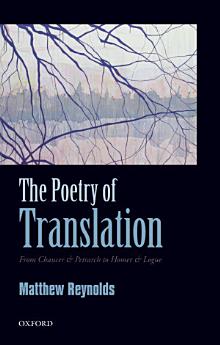The Poetry of Translation: From Chaucer & Petrarch to Homer & Logue
Sep 2011 · OUP Oxford
Ebook
384
Pages
family_home
Eligible
info
reportRatings and reviews aren’t verified Learn More
About this ebook
Poetry is supposed to be untranslatable. But many poems in English are also translations: Pope's Iliad, Pound's Cathay, and Dryden's Aeneis are only the most obvious examples. The Poetry of Translation explodes this paradox, launching a new theoretical approach to translation, and developing it through readings of English poem-translations, both major and neglected, from Chaucer and Petrarch to Homer and Logue. The word 'translation' includes within itself a picture: of something being carried across. This image gives a misleading idea of goes on in any translation; and poets have been quick to dislodge it with other metaphors. Poetry translation can be a process of opening; of pursuing desire, or succumbing to passion; of taking a view, or zooming in; of dying, metamorphosing, or bringing to life. These are the dominant metaphors that have jostled the idea of 'carrying across' in the history of poetry translation into English; and they form the spine of Reynolds's discussion. Where do these metaphors originate? Wide-ranging literary historical trends play their part; but a more important factor is what goes on in the poem that is being translated. Dryden thinks of himself as 'opening' Virgil's Aeneid because he thinks Virgil's Aeneid opens fate into world history; Pound tries to being Propertius to life because death and rebirth are central to Propertius's poems. In this way, translation can continue the creativity of its originals. The Poetry of Translation puts the translation of poetry back at the heart of English literature, allowing the many great poem-translations to be read anew.
About the author
Matthew Reynolds is author of The Realms of Verse (2001) and of Designs for a Happy Home: A Novel in Ten Interiors (2009). He has co-edited a book of translations, Dante in English (2005), revised the translation of Manzoni's The Betrothed (1997), and for several years chaired the Oxford-Weidenfeld Translation Prize. He writes frequently for the London Review of Books.
Rate this ebook
Tell us what you think.
Reading information
Smartphones and tablets
Install the Google Play Books app for Android and iPad/iPhone. It syncs automatically with your account and allows you to read online or offline wherever you are.
Laptops and computers
You can listen to audiobooks purchased on Google Play using your computer's web browser.
eReaders and other devices
To read on e-ink devices like Kobo eReaders, you'll need to download a file and transfer it to your device. Follow the detailed Help Center instructions to transfer the files to supported eReaders.






